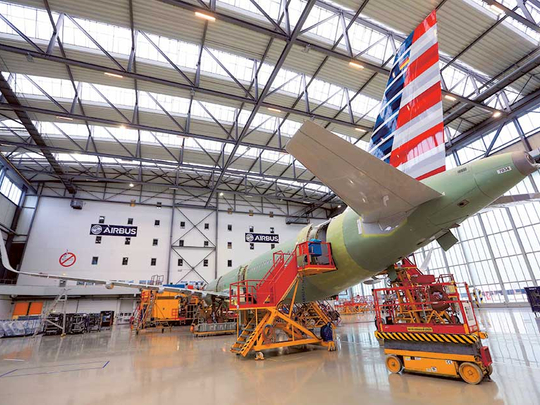
New Delhi, London: Buyers of Airbus Group SE’s troubled re-engined A320 narrow-body jet are preparing for delays to the aircraft extending into next year as they scale back fleet plans and seek compensation.
IndiGo, India’s biggest airline, will operate fewer of the A320neo jets in the current financial year than previously estimated, while AerCap Holdings NV, which has more than 220 on order, said it expects the delays to continue into 2017. US-based Air Lease Corp said last week it’s discussing financial remedies with the European planemaker with as many as eight deliveries now expected to be delayed next year.
Output of the A320neo is being disrupted by manufacturing delays at Pratt & Whitney, a unit of United Technologies Corp that builds the plane’s geared turbofan engine. Pratt in September cut this year’s delivery target to 150 engines from 200, saying it couldn’t produce certain parts fast enough.
“There’s a lot of uncertainty around the exact timetable for deliveries at the moment particularly those that are powered by the geared turbofan,” AerCap Chief Executive Officer Aengus Kelly said in a telephone interview. He said he expects more clarity before the end of the year.
Minimising impact
AerCap, the world’s largest independent lessor, has received only two of the 16 A320neos slated for the fourth quarter and said it doesn’t know how many of deliveries would slide into 2017.
“We are working closely with our customer to resolve the issue and minimize any impact to their operations,” Pratt said in an emailed statement. The company has said that the engine is achieving 99.9 per cent dispatch reliability while meeting promised performance on fuel burn and emissions reduction.
The A320neo is also powered by engines made by CFM International, a venture between General Electric Co and Safran SA. CFM hasn’t seen delays. Some customers for the narrow-bodies are placing orders without choosing between Pratt’s turbine or its rival built by CFM International, AerCap’s Kelly said.
AirAsia Bhd., Airbus’s top customer, received its first A320neos with the CFM engines in September. The Malaysian budget carrier is in talks with Airbus to bring forward deliveries for 2017, AirAsia Group Chief Executive Officer Tony Fernandes has said.
IndiGo is now expecting to fly 20 A320neos at the end of March, compared with an earlier target of 24, President Aditya Ghosh said on a conference call Tuesday. To offset the impact, the carrier operated by InterGlobe Aviation Ltd will deploy used aircraft on short-term leases, Ghosh said.
Watching CFM
The Indian carrier, Airbus’s biggest customer for the A320neo jets with 430 on order, took its first aircraft in March. The company, which has a contract with Pratt to provide power systems for the first 150 planes, is closely watching the performance of CFM’s competing powerplants, Ghosh said.
John Plueger, CEO of Air Lease, said on November 3 that the geared turbofan engine has so far performed well in service. He said Airbus told Air Lease that “some or all” of its eight Pratt-powered A320neo and A321neos scheduled for 2017 may be delayed.
Airbus has had “to allocate those engines as a scarce resource. Who those engines go to is a matter of debate and argument,” Plueger said. “Every airline and every lessor is saying, ‘We want ours first.’”
InterGlobe, which reported second-quarter earnings on Tuesday, said engine issues hurt IndiGo’s on-time performance and cancellation rates during the three months through September. The company posted a 24 per cent jump in after-tax profit to 1.4 billion rupees (Dh77.3 million, $21 million) for the period, missing the 1.8 billion rupees expected by analysts, according to an average of six estimates compiled by Bloomberg.
The roll-out of the A320neo, which first went into service with Deutsche Lufthansa AG in January, has been marred by several engine issues. At the outset, a cooling problem with the powerplant required operators to delay start-up under certain conditions so it could reach the right operating temperature. Airbus and the engine maker have said they devised a fix.










